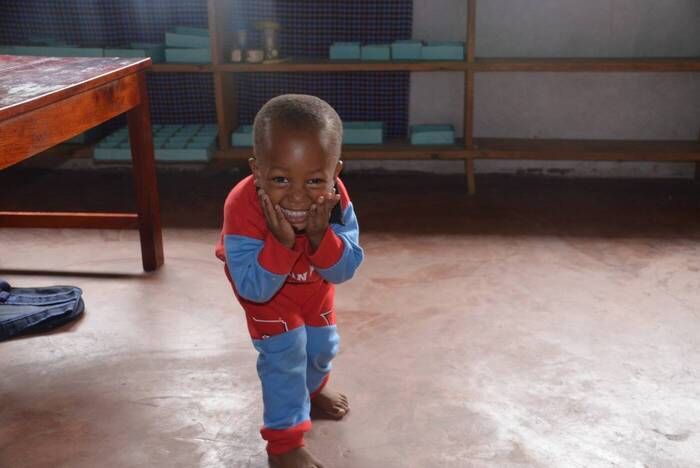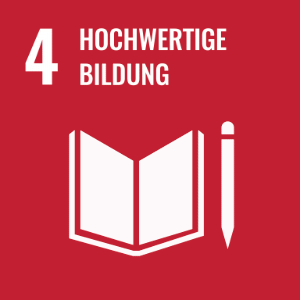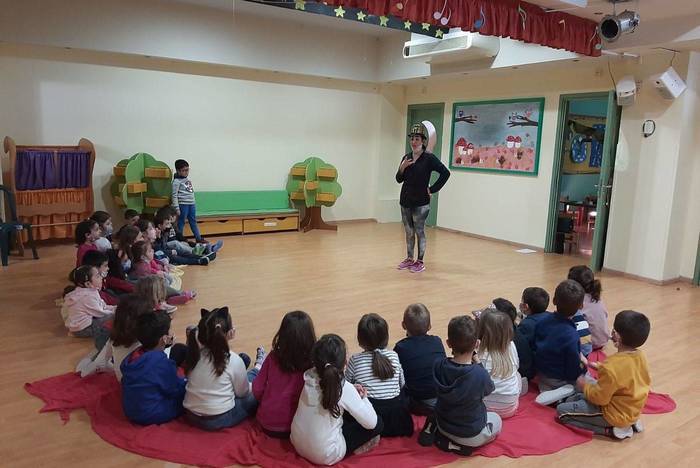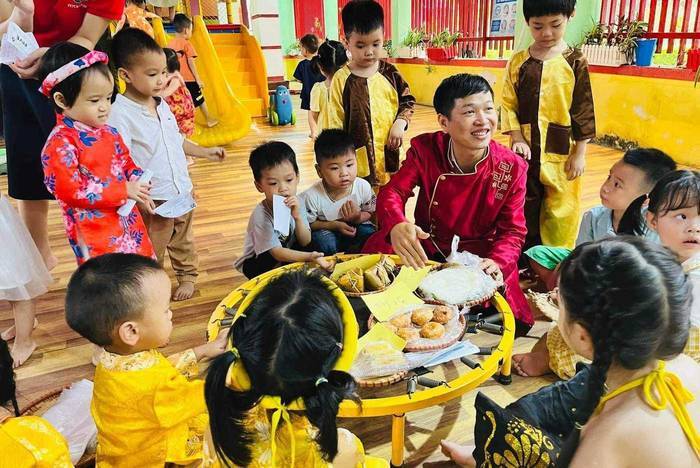01.08.2020/XNUMX/XNUMX / field reports
Experience report on the time in a kindergarten in Ghana
In Ghana you don't give up. You dream of reaching the stars and even if you hit the ground a million times, you always get up again. "You're gonna be fine," it says, and even if this apparently meaningless saying has gotten me really upset at one point or another, it's quite simply true.
Laura's time in Ghana
Because life is worth it
Preparations or: You're really doing this now, aren't you? "So what are you going to do after graduation?" "I'm going to Ghana for six months." "Oh, awesome!" I heard a lot of things like that or similar statements before I left my suitcase and my luggage in November last year grabbed a violin to volunteer for six months at a preschool in Ghana. I still haven't understood to this day what is supposed to be so blatant about it, but now, at the end of my stay, I have the feeling that the majority of the German population no longer really understands it (belongs to the long list of side effects that such a stay in Ghana entails, none of which I would want to miss).
Arrival and first days in Accra
I'm standing in Accra's Kotoka International Airport and wondering. Firstly, that I arrived at all, when I got lost so unerringly at Amsterdam Airport, and secondly, that someone stopped time. Nothing else can be the reason why I've been standing at the end of the meter-long queue for the official entry for what feels like hours and nothing has moved at all. Not a millimeter. A few attempts later to explain that I'm not carrying a drill, piano or parasol, but a violin, I realize that the problem is not the time, but two officers in green uniforms sitting behind their counters and comfortably in front of me doze off and maybe just dream about working. I get impatient, but quickly learn that in Ghana impatience is about as useful as a hair straightener for bald people.
Somehow I manage to get out of the building with my luggage and look for a yellow RGV t-shirt. The yellow t-shirt calmly trudges towards me and introduces itself as a game. As we sit in the car and make our way through Accra's crazy honking traffic, I can breathe a sigh of relief for the first time. The strange air tickles my nose and warms my lungs. I look out the open window, my hair is blowing in the evening breeze and already I feel free.
This feeling will not let me go in the next few days, when I get offered a city tour of the capital and a three-hour story about land and people and the volunteers of the study house Teshie-Nungua, in which I would live from now on, gradually get to know.
I had imagined settling in to be worse. Confusing, helpless and maybe a little bit lonely, but nothing like that happens. Instead, I have the feeling that I have somehow arrived between bunk beds and the chaos of students in shared apartments.
Let me tell you something about Ghana
Of course it's nonsense to think I can tell you about Ghana when you'd have to be there to understand what it's like, but I'll try anyway. You can buy food anytime and anywhere on the street, even from the Trotros (discarded delivery vans from Germany or the Netherlands, which in this country could not even crawl through the TÜV, but in Ghana without any problems, sometimes without a door and tend to be five more people than they can actually fit in, speed down the streets and are no less unsafe than any other means of transport).
You drink water from 500ml bags (IcePaks), from which you bite off a corner and suck out the slightly chlorine-tasting liquid like a vampire with withdrawal symptoms.
The streets are crowded with people who may call obruni (strangers) at you, but are always ready to help if you get lost while travelling. There are no clocks, or they tick a little slower than usual. I'm coming then usually indicates a half-hour wait, I'm coming soon, more like a 40-60 minute wait.
Everything you buy on the street is packed in tiny black plastic bags; especially the fruit that piles up on street stalls. But take care: mango and papaya season alternate in general.
Almost no price that is quoted to you is a fixed price. Bargain, barter, barter until either you or the taxi driver/vendor gets tired and gives up. I could go on writing indefinitely, but I almost have the feeling that this experience report is already going beyond the scope of the words I had in mind.
Schooling in Ghana - There is now a timetable!
School. Or kindergarten. Or nursery. Or all together. It's the third day of my career as a Ghanaian teacher and I'm hopping around in front of all the children (about 40 from three classes) of the kindergarten like a roly-poly. On two legs, on one leg, if I could also on my hands, but unfortunately that is beyond my area of competence.
After a nerve-racking hour, the little ones have learned a song with movement exercises and are just as rebellious as before. The three teachers in charge are sitting relaxed outside in the sun, making no attempt to do anything and watching the hustle and bustle from afar. My initial hope that they would eventually take the initiative and teach on their own is shattered. Slowly but surely my collar is bursting. I can't work properly for half a year with 40 children between the ages of 2 and 10, that's for sure. I can take one class, but all three at the same time?
One term later (after the Christmas holidays): I actually managed to introduce a timetable! Morning assembly (gathering of all children with song and prayer), then class, break, class, meal, nap. I took over Kindergarten 1 because its teacher was a bit overwhelmed with her fat baby, which she calls obolo (Fettie). A few weeks later we even had three volunteers – one for each class. Teaching can really be understood as real teaching. Even if the institution is still a crèche and garden, there is a kind of curriculum and there are even exams at the end of each term (every 12 weeks).
The children are enthusiastic about their obrunis at school, even if at first they pay little attention to what Loria (the name Laura was probably too difficult to remember) tells them, because Loria does not hit them. Beating fingers, legs and back with a cane for disobedience is still a common method of education in Ghana and it is almost impossible to get this out of the existing system, because once you listen to the beatings, you will not listen to anything else. The little ones first had to learn the hard way that there are other consequences, such as being excluded from the classroom or no coloring pictures. After a while, however, I actually earned a little respect and grew to love the little rascals.
We are out
If you work hard, you can party at the weekend. Well, yes, that too, but first and foremost, TRAVEL! Every other weekend I went to climb the highest mountain in Ghana (600m) in Ho, visit paradise in Cape3Points, sway on the suspension bridges of Kakum National Park, tremble in the slave castle of Cape Coast or see elephants up close in the Mole National Park to consider. As usual, nothing was planned, but just drove into the blue, which seemed pretty naïve and absurd to me at first, but I never had to sleep on the road on any of my trips. Granted, once on the roof, but never on the street.
I do not say goodbye ...
Taking leave. I would warmly recommend everything that I have organized in my six months, but definitely not saying goodbye. Leaving was the worst thing that happened to me during my time, which probably says a lot about my stay in itself. I have found a home, a family, wonderful friends and, by the way, myself. I have fallen in love with the country and the people and the only consolation I have is that I will be back. I've learned that there are more important things than structured career planning and a complete curriculum vitae, which I think far too many Germans forget and do what our society's pressure to perform dictates.
They lose themselves, become depressed or suffer from burnout, although the solution to their problems is right in front of them. Life. Just for life itself, it's worth going on, never giving up. In Ghana you don't give up. You dream of reaching the stars and even if you hit the ground a million times, you always get up again.
You'll be fine, they say, and even if this seemingly meaningless saying has gotten me really upset at one point or another, it's simply true.
Field report by Laura R., who participated in the Nursery Preschool Project in Ghana from November 2016 to April 2017.
More projects that interest you could
Have you not yet discovered a suitable program for your time abroad? No problem, we will present you more Volunteer projects abroadthat might pique your interest.
Are you perhaps still at the beginning of thinking about your trip and have no idea what might be right for you? Whether you want to go abroad as a volunteer for a short time, or if you prefer FSJ up to 12 months abroad afford? Maybe there is one Internship abroad in a specific subject area the best way for you to gain experience abroad?


Tanzania & Zanzibar | childcare


Greece | childcare

South Africa | childcare


Viet Nam | childcare

Namibia | Teach
